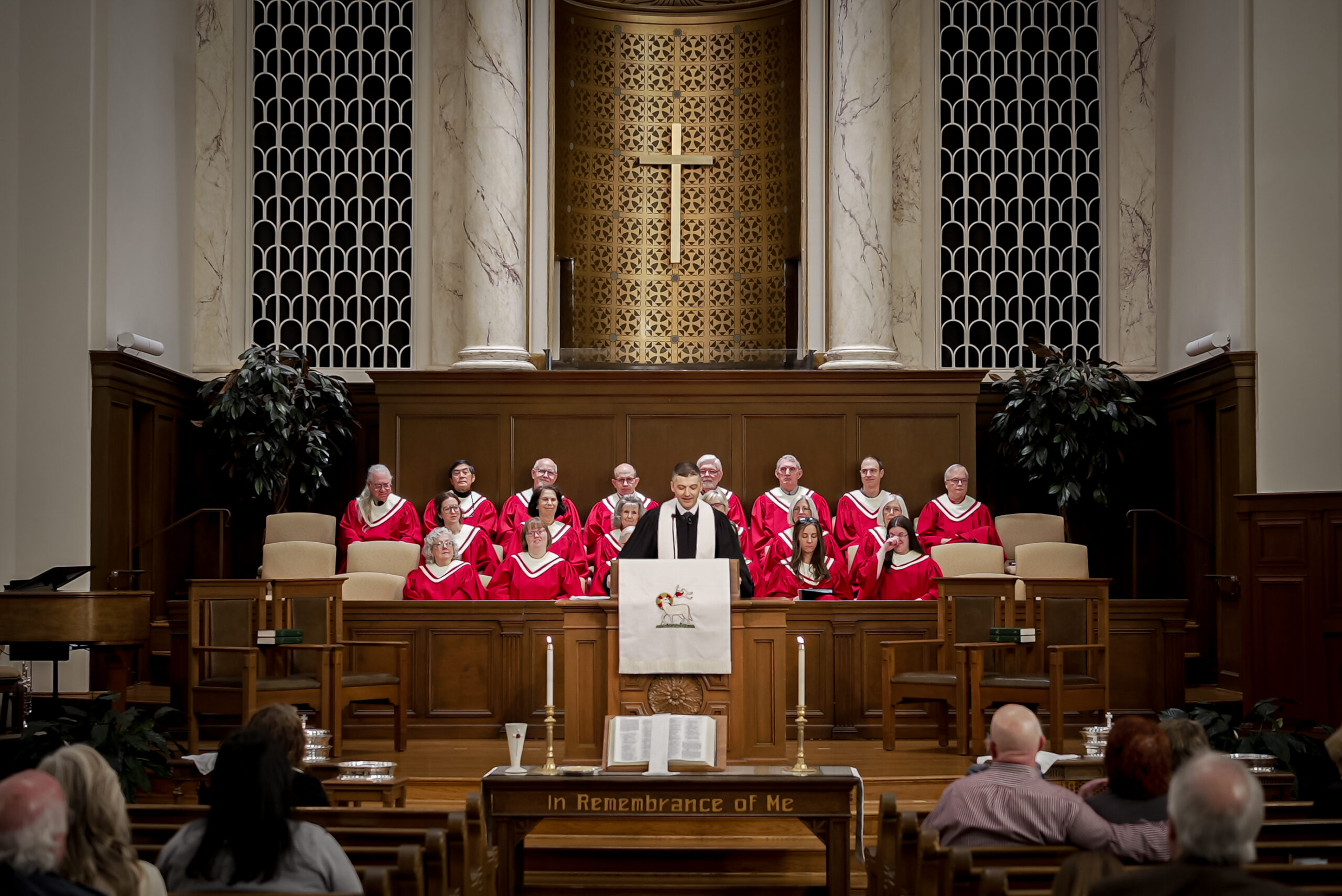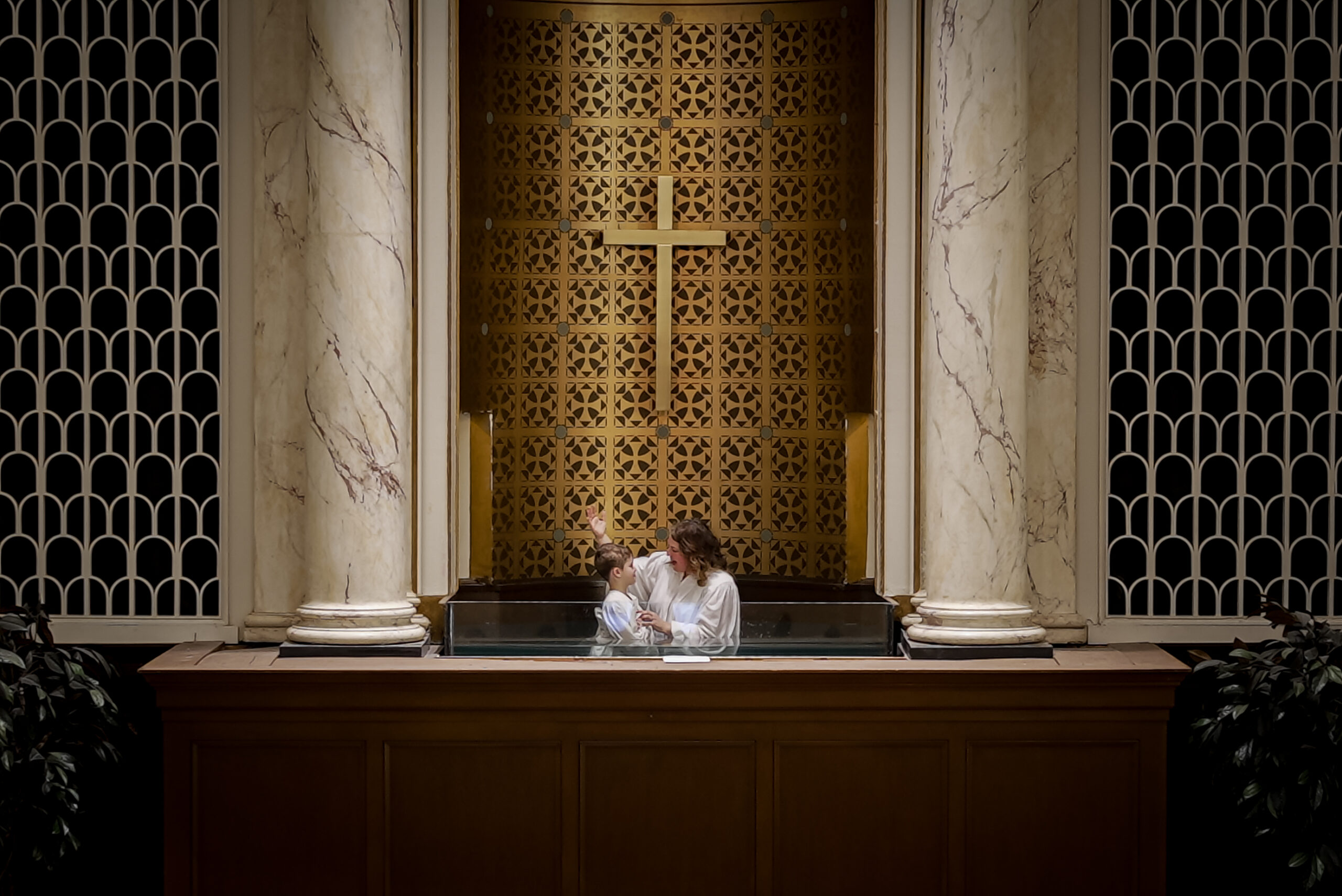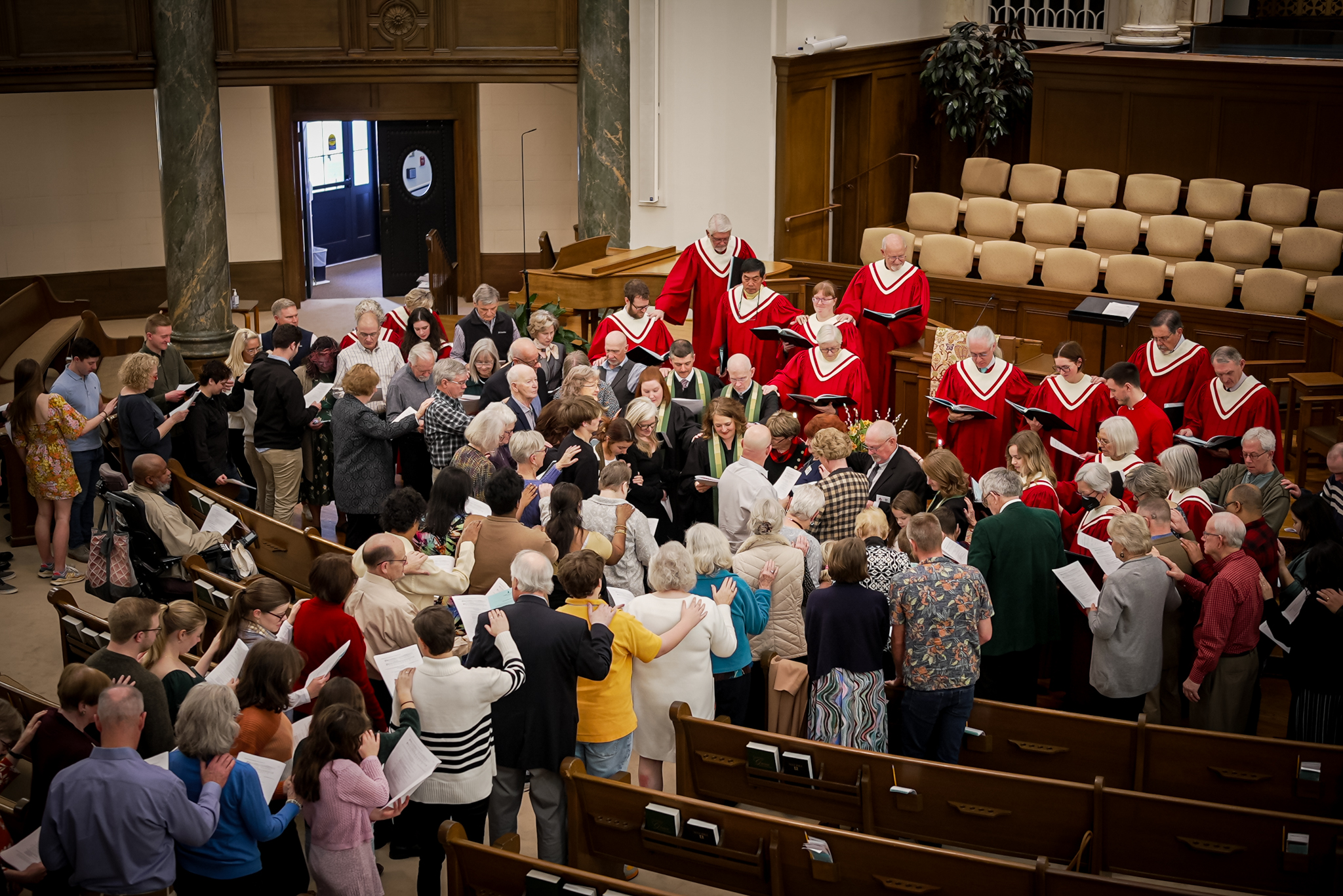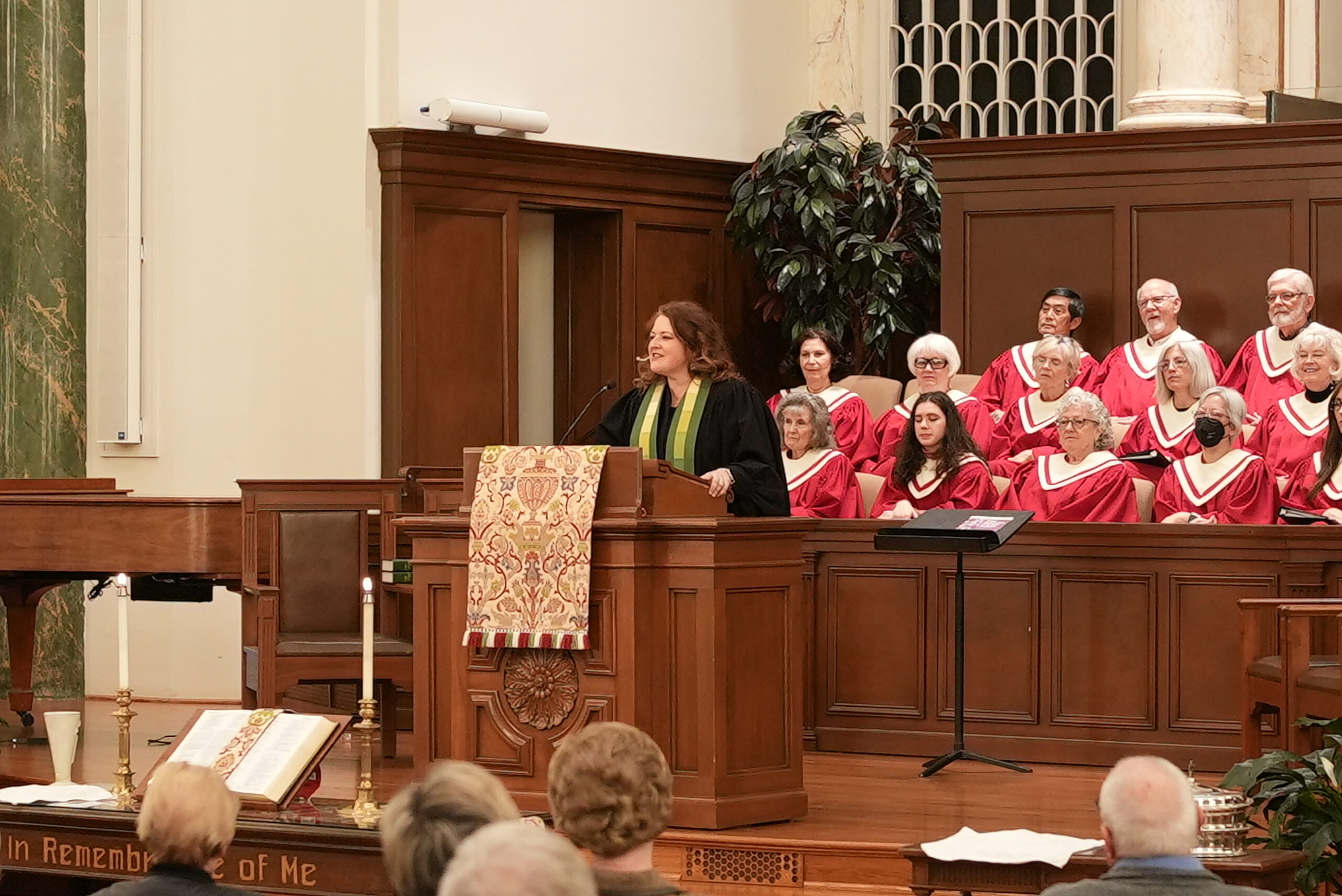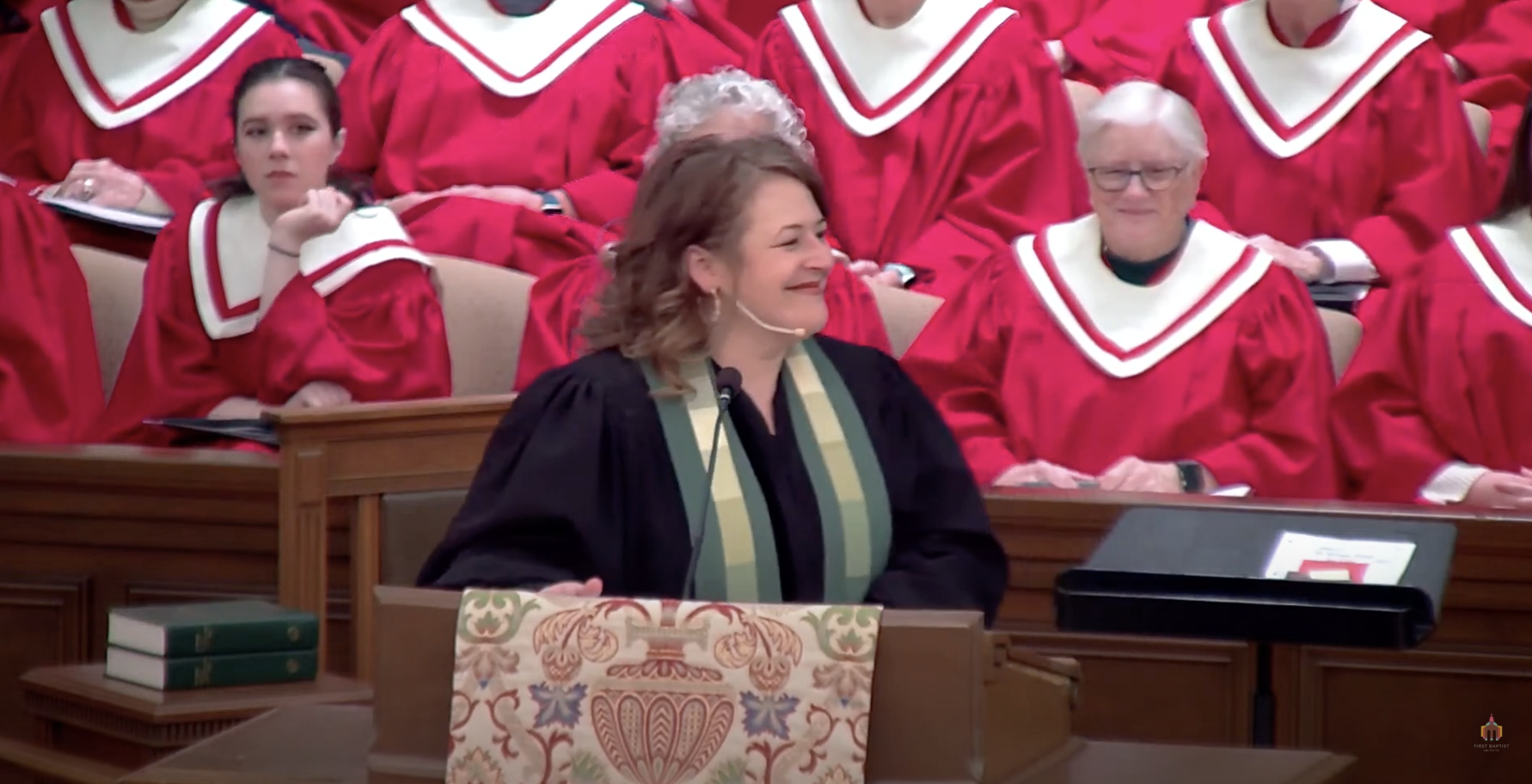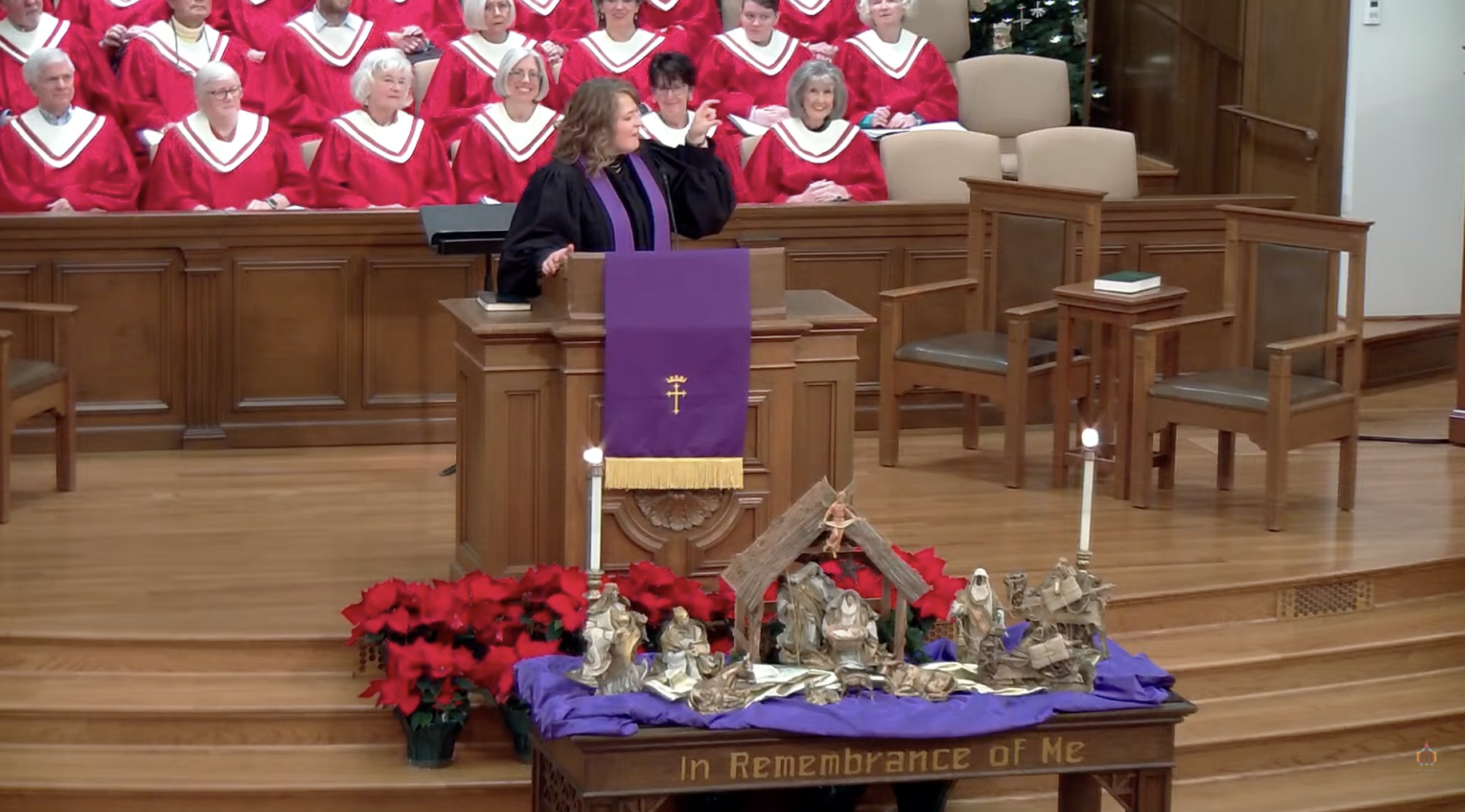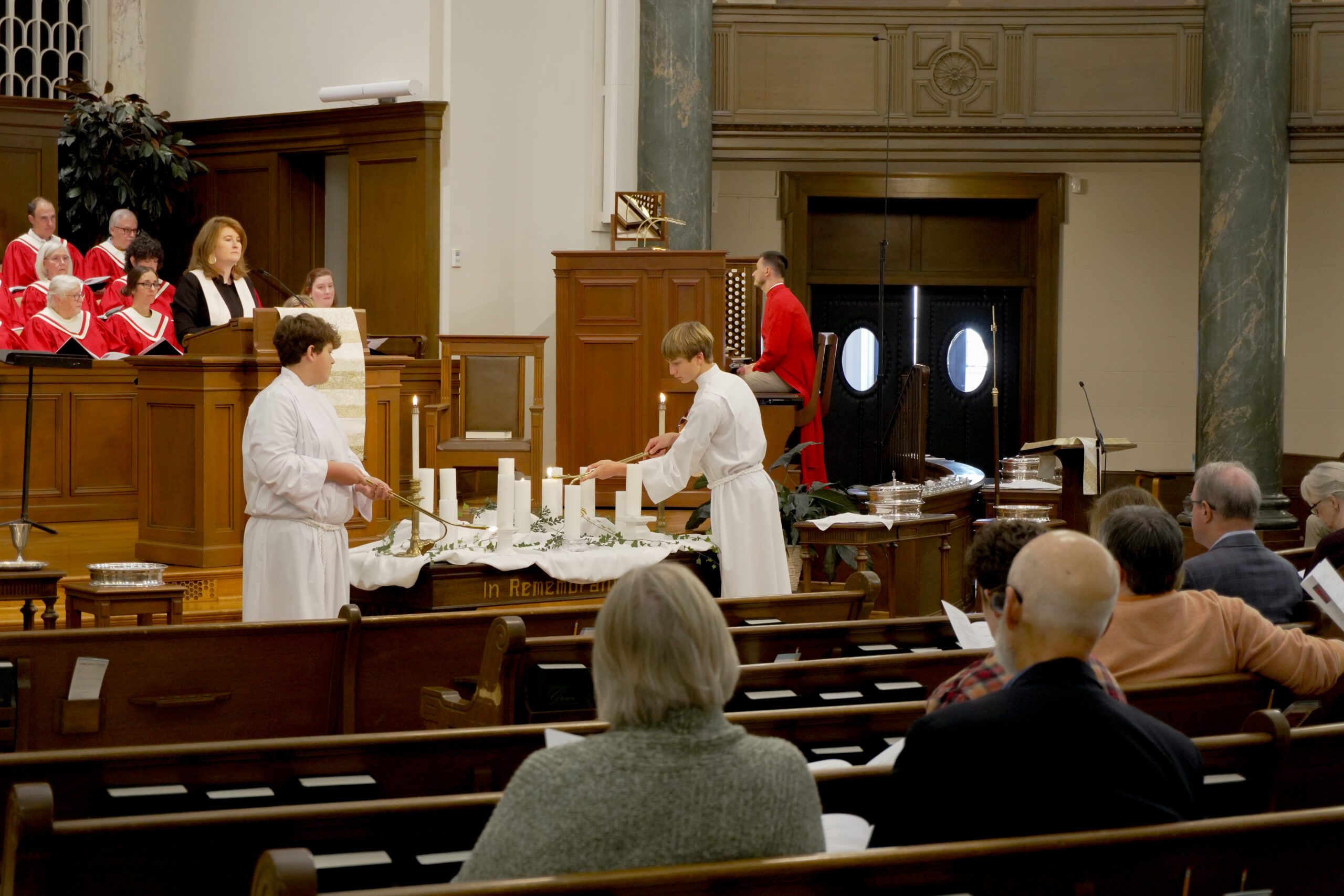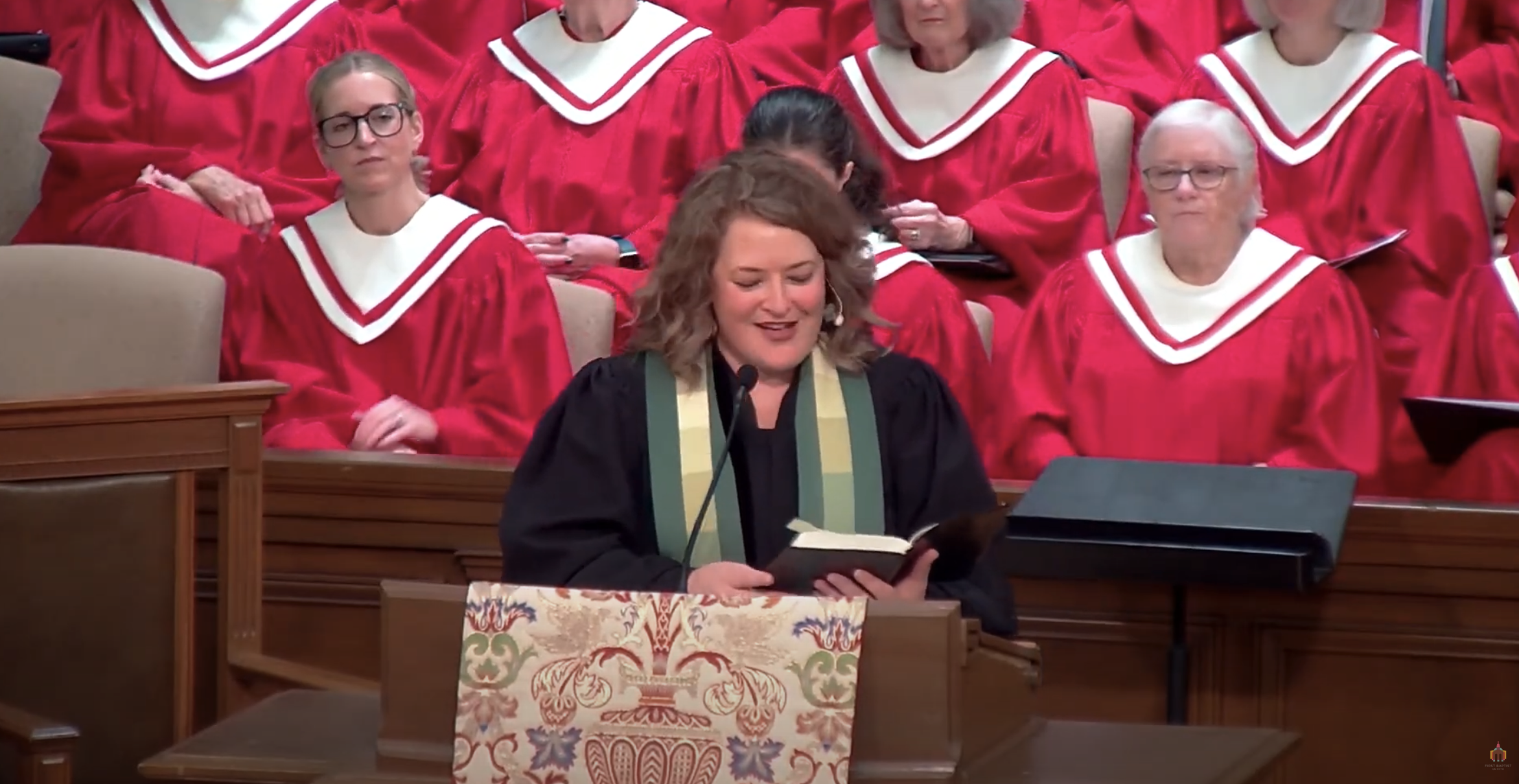I.I’m going to let you in on a pastor secret. Every pastor has a wild wedding story. We do. We file them away next to the extra splashy baptism stories and the times that funerals went awry. Just ask David about the wedding he played for where the couple was late because they forgot the marriage license, or Kyle about the wedding he officiated where the groom announced just before the wedding that because he follows “the Norse tradition,” (to which Kyle asked, “so you’re a Viking?”), there would be a demonstration involving swords during the ceremony. Get Amy and Jake going about the wedding where the bride was over an hour and twenty minutes late to her own wedding, and they led the congregation of 400 people in a hymnsing to pass the time. I’ve got stories about the time one partner accidentally dropped the ring, or when the flower girl refused to throw the petals “because they’re pretty and I want to keep them,” or when the junior bridesmaid passed right out during the vows. Even at my own, despite all the overthinking and excessive meaning-making I tried to layer into our wedding as I planned, I forgot to buy the grape juice for when we served communion to our bridal party, and had to whisper loudly to each of our friends down the line, “just pretend the grape juice is in there.”
You know, no matter how much money one spends on a wedding – how many beautiful garments are worn, or fancy food is eaten, or flowers sprawling endlessly across the venue – you can’t deny the truth that underneath all of that, people are just … themselves. Your mom worries all the time? Oh she’s worrying at the wedding. That one friend tells inappropriate jokes? He’s going to do that as you’re getting ready to walk down the aisle! Things go wrong, and they go right. The couple cries, the parents cry, the minister cries. (This minister surely cries!) The celebration may be the couple and a handful of witnesses in the park, or it may look exactly like your Pinterest board, as one bride proudly told me, but the truest truth of a wedding is that it is a celebration: bringing together ordinary friends and family across cultures and backgrounds, time and space, all united in but one extraordinary common purpose – to rejoice in the love set before them.
II.Jesus went to a wedding once, John tells us. In Cana of Galilee, a place that doesn’t hold all that much significance in the life and ministry of Jesus. It was simply a village, a stop in the reach of Jesus’s life.1
“On the third day,” John hints, and our ears should perk up, “there was a wedding at Cana of Galilee.” Mary was there, along with Jesus, and the disciples newly called to a life following Jesus on the Way. “They have no wine,” Mary whispers loudly to Jesus. (Perhaps it’s just a maternal urge to worry at a wedding!) For there in Galilee in the first century, these families were probably of modest means, ones who likely would have saved up for the celebration, proudly serving their wine alongside the figs and pomegranates, roasted lamb and honey. And surely they would have been mortified to learn that the wine was gone. For wine, you see, wasn’t just a beverage to liven up a good party. Rather, in ancient Jewish tradition, wine was a sign of joy and gladness, a sign of blessing, a sign of the presence of God. So when the wine ran out, the people would wonder: is this a sign that God’s blessing has run out too?
“They have no wine,” Mary says to Jesus, with the heavily implied “do something!!” attached. And in a turn of phrase we can’t fully understand without the benefit of body language or tone of voice, Jesus resists at first. “My hour has not yet come,” he says, the first of many such references in John. But then he relented to his mama, asking the servants to fill the six stone jars – there for the purpose of Jewish rituals of purification. “Fill those with water,” he instructs, all the way to the brim. “Do whatever he says,” Mary tells the servants. But it’s not like they were able to fill these huge stone jars simply by turning on the faucet. No no! These servants took multiple trips back and forth to the well, their arms and backs aching with the command of Jesus and what labor it took from them. But to their surprise – and I have to assume, to their delight – when Jesus asked them to draw some out for the steward to taste, all that water tasted as good as a vintage merlot, six stone jars’ worth, some 180 gallons. There’s not just a lot of wine, there’s a lot of good wine. The kind of wine that’s often served first, not last. For there, right in the midst of their daily life, their daily work, their daily pains and sufferings, Jesus becomes the host. A forgotten village becomes the site of Jesus’ first miracle. A wedding becomes the place for abundance. And a celebration that Jesus won’t let die down becomes the gift of delight.
III.This is one of those biblical stories that comes around each year in the lectionary, always during the season of Epiphany. Why? Because it tells us something about who Jesus is, about how God is revealed in his identity. It’s easy in a story like this to get stuck on the miracle. But for today, let’s consider instead the revealing, the truth made plain in this story: that Jesus is the miracle, that a God made flesh in this world who cares endlessly for all creation will show up at a wedding and make their joy complete by an overwhelming celebration of abundance. That’s the miracle, that’s the gift.
But I suppose there are some among us who may wonder why Jesus started here. Why, when there was need all around him, did Jesus go to a wedding? Surely there were other, more important things to do with Jesus’s time!
We know that tendency, right? Among the well-intentioned, kind-hearted people like you, you know what it’s like to arise each day focused on need: the need around you and among you, all that needs to be fixed, reformed, adjusted, overhauled, made right. We become like Mary here: “they have no wine,” meaning, “Jesus, we need more wine!” Jesus, I need more income. We need more hope. She needs more of a safety net. They need more friends.
It’s only human that we do this. But it is divine that Jesus shows us another way to live. Because if everywhere we look we see scarcity, then we miss the gift of abundance. If every day is seen through the lens of saving, then we miss the gift of savoring. If everything we do is practical, then we miss the gift of the delightful.
Perhaps that’s the tension that children’s author E. B. White recognized when he said, “I arise in the morning torn between a desire to improve (or save) the world and a desire to enjoy (or savor) the world. This makes it hard to plan the day.”2
I don’t have to tell you of the tendency in this modern life we live for folks to choose to miss the daily delights of living. How can I laugh when war rages across the world? How can I play when my dear friend is fighting cancer? How can I rest when there is more work to do than I’ll ever accomplish? How can I find joy when so many languish in depression, anxiety, loneliness, isolation?
Why, again we wonder, did Jesus choose his first miracle to be one of copious wine? Shouldn’t he have gotten along to the real work of ministry? There were people to be healed, and lessons to be taught, and tables to be turned over, and jubilee to be announced!
Small wonder, that miracle of his. And that’s just it. God came near in Jesus for the everyday, the ordinary, the candles in a dark sky, or small wonders known as delights. The “God who never runs out of holy things” came near so that we would not have to look far to find the divine grazing the skies, the trees, the ground, the arms of another.3 Like the hem of a holy garment brushing past the world, God’s delights are as available to us as a seed in the dark ground, an owl gazing at us from the tree, or a warm bowl of chili on a cold day, or a friend texting at just the right moment. They’re the gifts of meaningful work, and interesting things to learn, and a good run that makes all your senses come alive, and hope that outlasts despite all evidence to the contrary. God came for savoring too.
It’s what Isaiah meant when he said to the people of Israel, “You shall no more be termed Forsaken, and your land shall no more be termed Desolate; but you shall be called My Delight Is In Her, and your land Married.” Isaiah’s excitement here isn’t because things are going so well! Likely these words were spoken as the exiles returned home to Judea, to all the devastation in their land, the pieces they had to pick up and put back together. Rather, his excitement is because this news is just that good. “This story you keep telling yourself?,” Isaiah says to the Israelites, “that’s not your only story! You’re not just forsaken and desolate! Good news: you’re God’s delight!” Nothing that could have made their everyday circumstances different would change that, nor would it be a higher source of their joy.
So too is it with us. God’s delights are ours for the enjoying. There’s no shortage; these blessings won’t run out. We don’t have to earn them or tackle more serious things first. Delight comes, not when all the needs are met, or the suffering has ended, or the Pinterest board is perfect. They’re as abundant as wine at a wedding if only we but taste and see. Grace upon grace. A good life lived to the full.
IV.Maybe the invitation to consider delighting is one that feels too “woo woo,” too touchy-feely, too naive or optimistic, and not at all practical when there are things to do. Maybe your approach is like Roper, who received her Star word labeled “delight” last year, and immediately fought the urge to throw it in the trash. Maybe you’re at a place in your life or in your view of the world where it all feels too much: too much sorrow, too much fear, too much to do, and delights are just frivolous.
But to the cynics and the serious, the perfectionists and the workaholics, let’s remember the biblical witness of joy. Cymbals clanging and trumpets blowing with laughter. Dancing and singing and rejoicing from Miriam to Mary. Wisdom who created the world with God from the very beginning, “daily God’s delight.” Rejoicing shepherds on a hilltop as the sky was torn apart with good news. A father who throws a party when his wayward child comes home. Disciples, fearful then amazed, in the face of an empty tomb. Joy – not against sorrow or replacing it, but in it. Amidst it. Right in the marrow of it. Joy in exile, and joy in occupation. Joy in fear, and joy in persecution. Joy because no matter the state of our being, the Creator of the world refuses to abandon us. We will not be left orphaned, for God has come to us in Jesus: Jesus who understood the value of celebration, whose abundant wine is but a foretaste of his abundant grace, who once was spotted at a wedding.
Philosopher Sören Kierkegaard once said, “Christ turned water into wine, but the church has succeeded in doing something even more difficult: it has turned wine into water.” Oh the stories we could tell of religious practice mired in scarcity and seriousness, dull and stern and listless and lacking in delight. So let’s not do that! Let’s not be the killjoys that forget to celebrate because the challenges are too difficult, too widespread, too serious, too heartbreaking. Let’s use the good china, and lift our eyes to consider the lilies, and celebrate!
We’re not being flippant. These are hard times in which we live, with real challenges and unrelenting heartbreak. But that is not the only story. Because the truest story is that it is precisely into these ordinary places with extraordinary need that God comes near, that abundant blessing is given, that joy is most a gift, that delight is there for our experiencing. Jesus goes to a wedding! There his glory is revealed. So beloved church, on this ordinary January Sunday, when a deep chill is soon to settle in, how about we insist on becoming a people of God’s delight. How about we insist on inciting God’s joy.
V.Tomorrow morning just across the street, hundreds of our community’s citizens will gather for a breakfast honoring Dr. King. Gatherings will take place all throughout the day, all throughout the community, all throughout the country. And in every one, we’ll return again to the prophetic words of James Weldon Johnson, who in the face of abhorrent violence and oppression against Black Americans, wrote these words, “lift every voice and sing, till earth and heaven ring, ring with the harmony of liberty. Let our rejoicing rise—high as the listening skies. Let it resound loud as the rolling sea.” James Weldon Johnson knew it. Dr. King knew it. All the ancestors bringing about civil rights knew it – that joy is the fuel for the work. That delight is necessary for the work. And that joy knows no end.
Our artists and writers and poets knew this too. “We are not meant to cringe before God,” Madeline L’Engle said. “We are to enjoy all the delights the Lord has given to us, sunsets and sunrises, and a baby’s first laugh, and friendship and love, and the brilliance of the stars.”4 “Beauty and grace are performed,” writes Annie Dillard, “whether or not we will or sense them. The least we can do is try to be there.”5 And of course from Mary Oliver:
If you suddenly and unexpectedly feel joy,
don’t hesitate. Give in to it. There are plenty
of lives and whole towns destroyed or about
to be. We are not wise, and not very often
kind. And much can never be redeemed.
Still, life has some possibility left. Perhaps this
is its way of fighting back, that sometimes
something happens better than all the riches
or power in the world. It could be anything,
but very likely you notice it in the instant
when love begins. Anyway, that’s often the
case. Anyway, whatever it is, don’t be afraid
of its plenty. Joy is not made to be a crumb.6
Delight is not made to be a drop; delight is abundance. O taste and see that the Lord is good! Amen!


